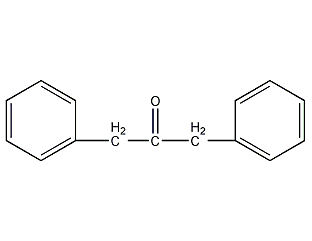
Structural formula
| Business number | 02LK |
|---|---|
| Molecular formula | C15H14O |
| Molecular weight | 210.27 |
| label |
1,3-diphenyl-2-propanone, 2-oxo-1,3-diphenylpropane, 1,3-diphenyl acetone, 1,3-biphenyl-2-propanone, 1,3-Diphenyl-2-propanone, Dibenzyl ketone, (C6H5CH2)2CO |
Numbering system
CAS number:102-04-5
MDL number:MFCD00004795
EINECS number:203-000-0
RTECS number:UC2010030
BRN number:974767
PubChem number:24860503
Physical property data
1. Properties: Yellow crystal.
2. Density (g/mL, 25℃): 1.04
3. Relative vapor density (g/mL, air=1): Undetermined
4. Melting point (ºC): 36
5. Boiling point (ºC, normal pressure): 331
6. Gas phase standard heat of combustion (enthalpy) (kJ·mol -1): -7908.6
7. The gas phase standard claims heat (enthalpy) (kJ·mol-1): 5.1
8 . The standard heat of combustion (enthalpy) of the crystal phase (kJ·mol-1): -7819.5
9. >-1): -84.0
10. Autoignition point or ignition temperature (ºC): Not determined
11. Vapor pressure (mmHg, 20ºC): Not determined Determined
12. Saturated vapor pressure (kPa, ºC): Undetermined
13. Heat of combustion (KJ/mol): Undetermined
14. Critical Temperature (ºC): Undetermined
15. Critical pressure (KPa): Undetermined
16. Log value of oil-water (octanol/water) partition coefficient: Undetermined
p>
17. Explosion upper limit (%, V/V): Undetermined
18. Explosion lower limit (%, V/V): Undetermined
19. Dissolution Properties: Soluble in ethanol and ether, insoluble in water.
Toxicological data
None yet
Ecological data
This substance is slightly hazardous to water.
Molecular structure data
1. Molar refractive index: 64.95
2. Molar volume (cm3/mol): 196.5
3. Isotonic specific volume (90.2K ): 500.8
4. Surface tension (dyne/cm): 42.1
5. Dielectric constant:
6. Dipole moment (10-24cm3):
7. Polarizability: 25.74
Compute chemical data
1. Reference value for hydrophobic parameter calculation (XlogP): 3.1
2. Number of hydrogen bond donors��:0
3. Number of hydrogen bond acceptors: 1
4. Number of rotatable chemical bonds: 4
5. Number of tautomers: 2
6. Topological molecule polar surface area 17.1
7. Number of heavy atoms: 16
8. Surface charge: 0
9. Complexity: 188
10. Number of isotope atoms: 0
11. Determine the number of atomic stereocenters: 0
12. Uncertain atomic stereocenter Number of stereocenters: 0
13. Determine the number of stereocenters of chemical bonds: 0
14. Uncertain number of stereocenters of chemical bonds: 0
15. Total Number of price key units: 1
Properties and stability
Avoid contact with strong oxidizing agents.
Storage method
Store in a cool, ventilated warehouse. Keep away from fire and heat sources. should be kept away from oxidizer, do not store together. Equipped with the appropriate variety and quantity of fire equipment. Suitable materials should be available in the storage area to contain spills.
Synthesis method
Calcium salt is made from the reaction of phenylacetic acid and calcium carbonate, and then decomposed by heating.
Purpose
Used in organic synthesis

 微信扫一扫打赏
微信扫一扫打赏

